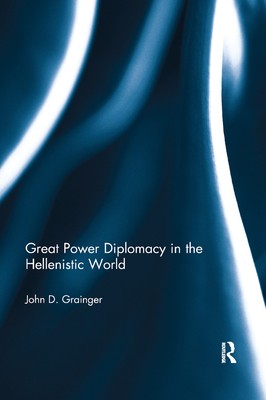
- We will send in 10–14 business days.
- Author: John D Grainger
- Publisher: Routledge
- ISBN-10: 036788190X
- ISBN-13: 9780367881900
- Format: 15.6 x 23.4 x 1.5 cm, minkšti viršeliai
- Language: English
- SAVE -10% with code: EXTRA
Reviews
Description
Diplomacy is a neglected aspect of Hellenistic history, despite the fact that war and peace were the major preoccupations of the rulers of the kingdoms of the time. It becomes clear that it is possible to discern a set of accepted practices which were generally followed by the kings from the time of Alexander to the approach of Rome. The republican states were less bound by such practices, and this applies above all to Rome and Carthage. By concentrating on diplomatic institutions and processes, therefore, it is possible to gain a new insight into the relations between the kingdoms.
This study investigates the making and duration of peace treaties, the purpose of so-called 'marriage alliances', the absence of summit meetings, and looks in detail at the relations between states from a diplomatic point of view, rather than only in terms of the wars they fought. The system which had emerged as a result of the personal relationships between Alexander's successors, continued in operation for at least two centuries. The intervention of Rome brought in a new great power which had no similar tradition, and the Hellenistic system crumbled therefore under Roman pressure.
EXTRA 10 % discount with code: EXTRA
The promotion ends in 23d.10:04:37
The discount code is valid when purchasing from 10 €. Discounts do not stack.
- Author: John D Grainger
- Publisher: Routledge
- ISBN-10: 036788190X
- ISBN-13: 9780367881900
- Format: 15.6 x 23.4 x 1.5 cm, minkšti viršeliai
- Language: English English
Diplomacy is a neglected aspect of Hellenistic history, despite the fact that war and peace were the major preoccupations of the rulers of the kingdoms of the time. It becomes clear that it is possible to discern a set of accepted practices which were generally followed by the kings from the time of Alexander to the approach of Rome. The republican states were less bound by such practices, and this applies above all to Rome and Carthage. By concentrating on diplomatic institutions and processes, therefore, it is possible to gain a new insight into the relations between the kingdoms.
This study investigates the making and duration of peace treaties, the purpose of so-called 'marriage alliances', the absence of summit meetings, and looks in detail at the relations between states from a diplomatic point of view, rather than only in terms of the wars they fought. The system which had emerged as a result of the personal relationships between Alexander's successors, continued in operation for at least two centuries. The intervention of Rome brought in a new great power which had no similar tradition, and the Hellenistic system crumbled therefore under Roman pressure.


Reviews